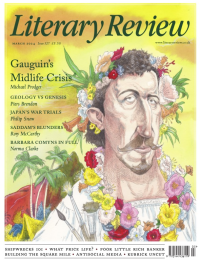Elizabeth Boyle
Disco 2000
After a Dance: Stories
By Bridget O’Connor
Picador 160pp £16.99
In Bridget O’Connor’s story ‘Plastered’, the creepy protagonist, Tony Wornel, frequently uses and abuses (like a literary Del Boy) the phrase ‘to cut a long story short’. To cut a short story even shorter, Wornel is a misogynistic stalker who is convinced that he’s a great guy and doesn’t need to listen to women because the words he will address to them are already pre-packaged in his head. All he needs to do is follow them, gaze at them, admire them as they talk: ‘I switched off a bit while her mouth worked. Her hair though, above the bland uniform, was really great to look at. Haloed. When I was back in my bed I’d dream I was brushing it, or I was a tiny thing lying in it, like a flea or a kirby grip really gripping in tight.’
Tony, or ‘Tone’, as he likes to call himself when he’s off the clock, is far from the only convincingly unlikeable character in this posthumous collection of some of O’Connor’s best work. A playwright and short-story writer who died in 2010 at the age of forty-nine, O’Connor had a masterly ability to conjure the dark, the shady, even the repulsive side of people. Many of her characters are not particularly appealing. All of them, however, feel addictively real: the young narrator of ‘Heavy Petting’, desperate, and failing, to escape her chaotic family home; the alcoholic narrator of the beautiful, tragic ‘Gabriel Ascending’; and Sandy – oh God, poor Sandy – just trying to be heard in ‘I’m Running Late’. Even when they’re tripping on E, or speed, or a random handful of pills from someone else’s medicine cabinet, their voices, dipping in and out of reality, keep the reader hooked. O’Connor seems drawn to those who are in some way driven by their appetites, whether for sex, fame or enough money to pay for the next hit. They are all very human: they have green veins and cold sores and disappointed dreams. Sure, they have inflated senses of their own importance, but don’t we all?
O’Connor’s sentences abound with poetic qualities – they rhyme, or alliterate, or play around with consonance and assonance – but hers is a kind of street poetry: ‘Tofu? It’s like thigh fat that tofu stuff, innit. Like eating someone else’s cellulite.’ Some sentences have the rhythm and cadence of song

Sign Up to our newsletter
Receive free articles, highlights from the archive, news, details of prizes, and much more.@Lit_Review
Follow Literary Review on Twitter
Twitter Feed
The era of dollar dominance might be coming to an end. But if not the dollar, which currency will be the backbone of the global economic system?
@HowardJDavies weighs up the alternatives.
Howard Davies - Greenbacks Down, First Editions Up
Howard Davies: Greenbacks Down, First Editions Up - Our Dollar, Your Problem: An Insider’s View of Seven Turbulent...
literaryreview.co.uk
Johannes Gutenberg cut corners at every turn when putting together his bible. How, then, did his creation achieve such renown?
@JosephHone_ investigates.
Joseph Hone - Start the Presses!
Joseph Hone: Start the Presses! - Johannes Gutenberg: A Biography in Books by Eric Marshall White
literaryreview.co.uk
Convinced of her own brilliance, Gertrude Stein wished to be ‘as popular as Gilbert and Sullivan’ and laboured tirelessly to ensure that her celebrity would outlive her.
@sophieolive examines the real Stein.
Sophie Oliver - The Once & Future Genius
Sophie Oliver: The Once & Future Genius - Gertrude Stein: An Afterlife by Francesca Wade
literaryreview.co.uk